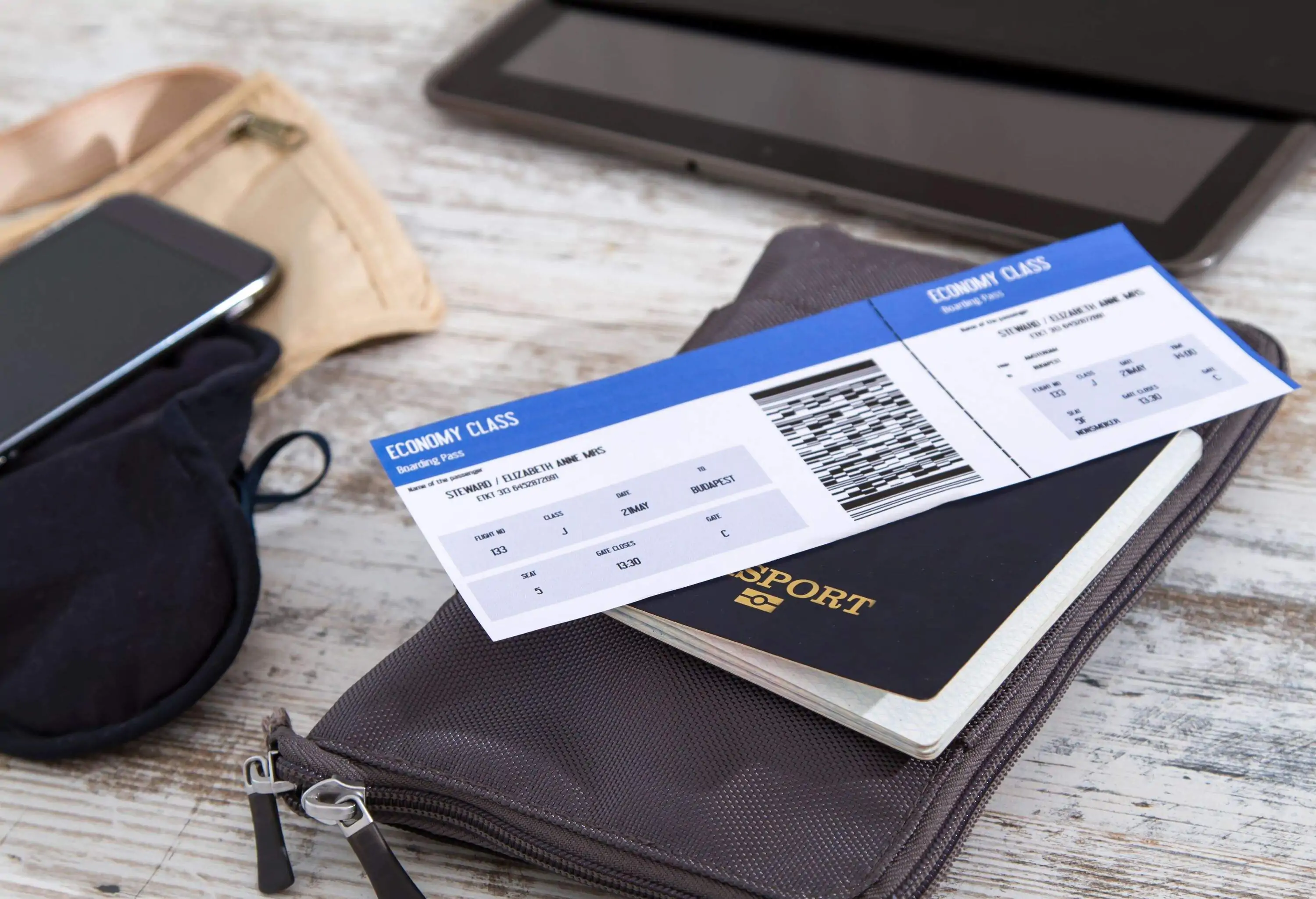Know what to do before, during and after your flight
Dreaming of an international trip? Whether you’re embarking on your first backpacking adventure, or just want to hit the beach in a far-flung locale, check out this guide to finding cheap international flights and what you need to know once you do.
Despite the popular misconception, flying abroad doesn’t mean you have to break the bank. Using our savvy search tips and comparing different flight options at Cheapflights.com could mean a trip abroad may just be cheaper than a domestic trip. Why not start a flight search and find out for yourself? But first, here’s what you need to know.
1. Planning an international trip
2. How to find cheap international flights
3. Travel tips
1. Planning an international trip
Get a Passport
In general, if you want to travel outside the U.S., you’ll need a passport to enter other countries and re-enter the U.S. A passport is an officially issued government document certifying your identity and citizenship, allowing you to travel abroad with the protections guaranteed to U.S. citizens. Here’s our guide for how to apply for a passport. Apply early for a passport and consult our passport photo tips to make the process as smooth as possible. If you already have a passport, be sure it’s valid for six months or more as some countries will not allow you to enter with a passport that expires within six months. Some countries also require that your passport contain one or more blank pages for stamps.
Visa check
Check the visa requirements as some countries require a visa to enter the country. Refer to information from the embassy or consulate of the country you’re planning to visit and the U.S. Department of State’s list of visa requirements by country. If you do need a visa, submit your visa application early, as it can take weeks to process depending on your destination. Visit the U.S. Department of State website for comprehensive information regarding passports, visas and other documents required for travel no matter where you’re headed.
Consider travel health insurance
Should you buy travel insurance? No one wants to think about getting sick or injured while on vacation, but it’s important to be prepared. You might already have some insurance coverage and just don’t know about it. Check with your health insurance provider, credit card company or auto club and see what’s covered during travel. Some travel insurance plans include overseas medical coverage; some just cover personal property and transportation expenses. Be sure to check with your current medical insurance provider to see what’s covered out of state and overseas. Travelers can also buy supplementary travel insurance that provides benefits like emergency medical evacuation.
Know which vaccinations you need
For some regions of the world, immunizations are necessary prior to travel. Proof of immunization is a requirement for entering some countries. It’s best to schedule a visit to your doctor to discuss your travel plans and medical conditions. Some immunizations require more than one shot and some prescriptions like anti-malarial medications may have to be started weeks in advance. Consult the Centers for Disease Control and Prevention, which includes destination-specific information.
2. How to find cheap international flights
Compare amenities
If ticket prices are the same or close, check to see what amenities are offered on your route. From which airline offers the most legroom to in-flight entertainment to meal service, it might make sense to spend a little extra on the plane ticket to cruise in comfort. Or, if you’re looking to travel as cheaply as possible, it may be worth bringing your own entertainment and snacks to save money on airfare.
Avoid fees that can bust your travel budget. Make sure you’ve calculated all the costs before you hit “book.” Depending on the airline, you could be charged for priority boarding, seat selection, carry-on luggage, checked luggage and more.
Review the fine print
Review all the ticket information like your name, flight dates and times carefully. Depending on where you book your ticket, the flight times may be the local times at your destination. Make sure the name on your ticket exactly matches the name on your passport to avoid problems at the airport.
Finally, review all the terms and conditions of the ticket, also known as a contract of carriage. Learn who to contact if there are flight delays or cancellations or you want to alter your itinerary for any reason.
Reading the fine print when booking your airline ticket, hotel or rental car can pay. From saving money on car insurance when using your credit card to pay for your car rental to knowing what compensation you are entitled to if you are bumped from an overbooked flight, the fine print is there for a reason. Here are all the ways it pays to read the fine print.
Consider alternative destinations
People eager to get away should look for the deal rather than the destination. For example, if you want a beach holiday, focus on searching all destinations near the beach rather than only searching for beach vacations in one spot, like the Caribbean or the Mediterranean. Sometimes choosing a lesser-known city can bring additional savings.
Not sure where or when you want to get away? Save big by checking out Cheapflights.com’s special offers page, which include an ever-changing collection of flight deals, vacation packages and cruises, which include international deals and packages.
If you just need to get away, explore options in the mountains, by lakes or in cities. You can often choose a destination that has a similar feel to a pricier local and travel for less by opting for an alternative destination. Taking the path less traveled often pays off.
Look for new airline routes
Airlines are constantly adding new routes. Not only does the introduction of new routes mean new vacation destinations, but it also opens some great opportunities to snatch up cheap seats. Most airlines offer deep discounts on inaugural flights to celebrate new routes.
Travel during shoulder and off-peak seasons
Shoulder season is the sweet spot smack dab between peak season (when everyone travels to a destination) and low season (when the weather is less than ideal). Those who travel to a place during shoulder season are afforded great deals, good weather and fewer crowds. Shoulder season differs by destination, but a little research will go a long way when it comes to savings. For example, many travelers falsely assume the Caribbean is sweltering in summer, but it’s not. Summer is an excellent time to visit the Caribbean where the temperatures are only a few degrees higher than they are in January.
Be flexible with your travel dates
Having a range of departure and return dates gives you more alternatives and more leverage for savings. Leaving a day earlier or later may save you hundreds of dollars. Adding or subtracting a day could also lead to additional savings.
Be flexible with the times of day you depart and return. The fewer restrictions you impose on your travel plans, the better. Consider flying overnight; wake up at your vacation destination. An additional advantage of booking an overnight flight is that you not only save on the plane ticket, but you also don’t need a hotel for that night.
Mix and match flights
Sometimes flying two different airlines and booking two one-way tickets is cheaper than booking one round-trip ticket on the same airline. Mixing and matching different flights on different airlines also has the added benefit of getting you better arrival and departure times. Search round-trip airfare and then search one-way fares. Then, search one-way fares on separate airlines to further compare prices. While airlines sometimes charge more for one-way fares, this isn’t always the case, and it is an opportunity to save that many miss.
Watch the news
Currency fluctuations can mean big savings to far-flung locales. Look for places where the dollar is strong against the local currency by watching news reports.
Check for discount eligibility
You might be able to get deeper discounts via affiliate programs like airline or hotel loyalty programs; travel rewards credit cards, or senior citizen and student discounts.
Search for one traveler first
If you’re booking for more than one person, check flight prices as both a solo traveler and as multiple travelers. While you may not be able to get all the tickets for the same low price, it may be cheaper than buying the entire group’s flight in one transaction. While this option may mean your group’s seat assignments may be separated, pick window or aisle seats and then barter with the person stuck in the middle seat, who will likely be more than happy to trade. Worried about legroom? Refer to our airline legroom guide.
Consider alternative airports
Airports that are hubs for airlines often have better deals. For destinations that are served by multiple airports, like London, and Shenzhen/Hong Kong/Macau, check each airport for the best rates. Searching all area airports (and even consider departing from one airport and returning to another) may rack up savings. Just make sure the costs associated with getting to and from the airport don’t add up to more than the amount you saved on the airfare.
Consider alternative airlines
Check all airlines that fly to and from your departure and destination cities. You may find deep discounts on smaller, lesser-known international airlines like Aer Lingus, JetStar and WOW Air. Just be sure you read the fine print before you purchase as low-cost carriers sometime tack on extra charges for things like seat assignments and carry-on luggage that can quickly close the gap in savings.
Consider a stopover
Consider taking more time off and adding a stopover to your getaway for a BOGO (buy one, get one) vacay. Keep in mind, stopovers are different from layovers. Layovers are multi-hour stops in between connecting flights. A stopover is 24 hours or more, allowing travelers the chance to explore a destination before journeying onward to another. The prospect of a dual-destination vacation may make it easier to contend with high airfare. Icelandair and Emirates offer stopover travel at no additional cost to the plane ticket.
Be savvy with social media
Follow your favorite airlines on social media to be the first to know about flight sales and last-minute deals. Sales and promo codes are often posted on airline social media channels before they land in your email inbox or on the company’s website. Following airlines and travel brands on social media can clue you into deals you may have missed otherwise. Cheapflights.com posts Deal of the Week offers and often has contests to win free travel (see our previous winners here and follow us on Facebook and Twitter).
Buy in local currency
Buying a ticket in local currency and making it appear you are buying the airline ticket from within the country where you’ll be traveling can mean substantial savings (just change the settings on your web browser). Likewise, if you plan to travel within a country, like Bangkok, Thailand, to Phuket, Thailand, searching for that ticket as if you were already in Thailand and willing to use Thai baht to pay for it may mean substantial savings, even after potential foreign transaction fees that may be charged by your credit card.
Be rewarded
If, after trying our steps, flight prices are still too high, consider using reward mileage to book one-way or your entire trip. Reward points can also be used to splurge on an upgrade from coach to premium economy, business or first class – perfect for long-haul flights that span several time zones.
Consider package deals
If you need a hotel and/or rental car at your destination, consider booking an air and hotel, or air, hotel and car rental package. Buying in bulk may make your overall trip cheaper. Don’t forget to save time too with these four programs that will help you breeze through security.
3. Travel tips
Before flying
What to know when flying internationally
Be a savvy traveler as you fill up your passport with these important travel tips. Before you fly, check out our 25 travel hacks and make sure you don’t skip these 10 things to do before your flight.
Avoid jet lag
Crossing multiple time zones can be challenging even to the most seasoned travelers. Follow our trips to avoid jetlag, a sleep disorder that sometimes occur when a person travels quickly across multiple time zones.
Pack smart
No matter your packing habits or style, follow these tips for traveling light and smart. Pack everything in your carry-on that you would need to survive if you lost your luggage, including your passport, ID, wallet, all tickets, travel documents, medications (prescription and over the counter) and cellphone. Consider also packing a change of clothes, gadget charger and/or converter and a snack. Check out the amenities your airline offers for free and learn the dos and don’ts of bringing alcohol on a flight. If you can pack light, you can save on baggage fees. It is possible to travel with one carry-on with our tips.
Stay healthy
Unbeknownst to you, your prescription medicines and even some over-the-counter medications might be illegal where you are headed. From how to pack your medication to what to do if you run out of medication while abroad, follow our comprehensive guide for traveling with medication.
If you are traveling while pregnant or recently after giving birth, check out our guide to traveling while pregnant, as well as our guide to breastfeeding while traveling.
At the airport
Arrive early
Be sure to confirm how early you should arrive at the airport. In general, travelers should arrive three hours prior to departure. If you’re checking in oversize luggage, skis, golf clubs, wheelchairs or other items, be sure to allow extra time. Follow our 16 rules of airtiquette: airport edition to get through security in a snap.
Be in the know about airport amenities
Visit the websites for your departure, arrival, layover and stopover airports to learn what amenities are available at each, such as which airports have the best beer, are great for kids, have charging stations for electronics and are the best places for an impromptu photo shoot. If you aren’t flying business or first class or a frequent flier, consider buying a day pass at an airport lounge to enjoy pre-flight snacks, rest during layovers, or freshen up upon arrival.
After landing
Money matters
What’s the local currency and what is the exchange rate? Sites like Oanda.com and xe.com are great resources to determine what the exchange rate is before you get on the plane.
Don’t leave home without several money options, including credit and/or debit cards, an ATM card and cash. While some travelers prefer to carry traveler’s checks and get a small amount of local currency ahead of time, travelers will get the best exchange rate via an ATM machine in the country. If you want to take traveler’s checks, be sure to write down the check numbers and keep them in a safe place should your checks be lost or stolen. (Leave a copy of the numbers with a family member or friend at home too.)
It’s best to bring some U.S. currency in small bills for use in case you need to exchange additional money. Some countries, like many Caribbean countries and Canada, accept U.S. currency too. If your trip is short, you might not need to obtain local currency.
Be smart
You might be tempted to go directly to a currency exchange counter and buy a local SIM card the minute you step through customs at your destination. Take a deep breath and look for an ATM instead. Even with bank fees, you will almost always get a better exchange rate at the ATM machine. The same goes for SIM cards. Do research before you go. Many cellular companies offer competitively priced international plans that allow you to use your own phone while traveling abroad.
Use Wi-Fi
Consider how you will stay in touch while you are away. Will you need an international roaming plan, or will you rely on Wi-Fi to stay connected? Check out our tips for avoiding high smartphone costs while abroad. Avoid massive data roaming charges by connecting to Wi-Fi to send text messages and check emails.
Plan your airport transportation
Most public transportation maps are also available online; it’s a good idea to print out a map of the area before you leave. Consider printing out specific sections from travel guides online to read on the plane and refer to during your trip. Determine ahead of time how you will travel from the airport to your accommodation. Whether by public transportation, hotel shuttle, or hailed taxi, be sure you book with licensed, reputable companies. Avoid the throngs of drivers jostling for your attention and your luggage upon arrival.
Be prepared for emergencies
Be prepared for the unexpected. Leave emergency contact information and copies of your passport biographic data page and prescriptions with family and trusted friends. Take two copies with you, one in your carry-on and one in your checked luggage. Carry emergency contact information for your family with you when you travel. Be sure to also pencil this information in the emergency contact information section of your passport too. Learn the contact information for the nearest U.S. embassy or consulate, available on the State Department’s Country Specific Information page for each country and on each embassy or consulate’s website. Provide this information to your family and friends in case of an emergency. If your family needs to reach you because of an emergency at home or if they’re worried about your welfare, they can call the Office of Overseas Citizens Services in Washington, D.C. at 1-202-647-5225“>1-202-647-5225 (after hours). The State Department will relay the message to the consular officers in the country where you are. The consular officers will then try to locate you, pass on any urgent messages, and, if you wish, report back to your family on your welfare.
Now that you have all the tools, start your search for an international flight at Cheapflights.com
Editor’s note: Hello, travelers. We revised this post for you to make sure it’s up-to-date, comprehensive and even more awesome.




